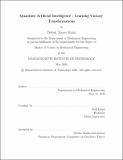Quantum artificial intelligence : learning unitary transformations
Author(s)
Kiani, Bobak Toussi.
Download1191844236-MIT.pdf (1.691Mb)
Other Contributors
Massachusetts Institute of Technology. Department of Mechanical Engineering.
Advisor
Seth Lloyd.
Terms of use
Metadata
Show full item recordAbstract
Linear algebra is a simple yet elegant mathematical framework that serves as the mathematical bedrock for many scientific and engineering disciplines. Broadly defined as the study of linear equations represented as vectors and matrices, linear algebra provides a mathematical toolbox for manipulating and controlling many physical systems. For example, linear algebra is central to the modeling of quantum mechanical phenomena and machine learning algorithms. Within the broad landscape of matrices studied in linear algebra, unitary matrices stand apart for their special properties, namely that they preserve norms and have easy to calculate inverses. Interpreted from an algorithmic or control setting, unitary matrices are used to describe and manipulate many physical systems. Relevant to the current work, unitary matrices are commonly studied in quantum mechanics where they formulate the time evolution of quantum states and in artificial intelligence where they provide a means to construct stable learning algorithms by preserving norms. One natural question that arises when studying unitary matrices is how difficult it is to learn them. Such a question may arise, for example, when one would like to learn the dynamics of a quantum system or apply unitary transformations to data embedded into a machine learning algorithm. In this thesis, I examine the hardness of learning unitary matrices both in the context of deep learning and quantum computation. This work aims to both advance our general mathematical understanding of unitary matrices and provide a framework for integrating unitary matrices into classical or quantum algorithms. Different forms of parameterizing unitary matrices, both in the quantum and classical regimes, are compared in this work. In general, experiments show that learning an arbitrary dxd² unitary matrix requires at least d² parameters in the learning algorithm regardless of the parameterization considered. In classical (non-quantum) settings, unitary matrices can be constructed by composing products of operators that act on smaller subspaces of the unitary manifold. In the quantum setting, there also exists the possibility of parameterizing unitary matrices in the Hamiltonian setting, where it is shown that repeatedly applying two alternating Hamiltonians is sufficient to learn an arbitrary unitary matrix. Finally, I discuss applications of this work in quantum and deep learning settings. For near term quantum computers, applying a desired set of gates may not be efficiently possible. Instead, desired unitary matrices can be learned from a given set of available gates (similar to ideas discussed in quantum controls). Understanding the learnability of unitary matrices can also aid efforts to integrate unitary matrices into neural networks and quantum deep learning algorithms. For example, deep learning algorithms implemented in quantum computers may leverage parameterizations discussed here to form layers in a quantum learning architecture.
Description
Thesis: S.M., Massachusetts Institute of Technology, Department of Mechanical Engineering, May, 2020 Cataloged from the official PDF of thesis. Includes bibliographical references (pages 77-83).
Date issued
2020Department
Massachusetts Institute of Technology. Department of Mechanical EngineeringPublisher
Massachusetts Institute of Technology
Keywords
Mechanical Engineering.